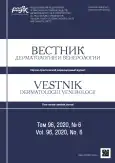Experience of using an emollient with an anti-inflammatory effect based on ammonium glycyrrhizinate in the complex therapy of patients with atopic dermatitis
- Authors: Khairutdinov V.R.1, Samtsov A.V.1
-
Affiliations:
- S.M. Kirov Military Medical Academy
- Issue: Vol 96, No 6 (2020)
- Pages: 29-35
- Section: ORIGINAL STUDIES
- URL: https://bakhtiniada.ru/0042-4609/article/view/117509
- DOI: https://doi.org/10.25208/vdv1201
- ID: 117509
Cite item
Full Text
Abstract
Background. Despite the advances achieved in recent years in the treatment of AD, prevention and rehabilitation of patients, who suffering from this disease, belong to the most difficult tasks of practical dermatovenerology.
Objective. The aim of this study was to assess the efficacy, safety and tolerability of Reglisam Cream in the complex therapy of patients with atopic dermatitis.
Methods. The study involved 48 patients with atopic dermatitis, who were divided into two groups. There were two observation periods for each patient: 28 days — the period of exacerbation therapy, and 6 months — basic care and prevention of relapses.
In exacerbation period all patients used external moisturizers in addition to topical glucocorticosteroids: in group I (study group) patients applied Reglisam Cream to the skin; in group II (control group) — cold cream. After the period of exacerbation patients of group I were prescribed basic therapy Reglisam Cream for 6 months, patients of group II — cold cream. In each group were assessed the therapeutic efficacy, safety and tolerability of treatment. During the study were conducted registration of adverse events, assessment of the dermatological status with the determination of the intensity of pruritus according to the visual analogue 10-point scale, the calculation of the severity index of the disease and the area of the lesion in eczema / atopic dermatitis (EASI) and the dermatological index of quality of life (DLQI), measurement of skin moisture, general clinical research.
Results. In the first 28 days of acute atopic dermatitis period therapy, the EASI index decreased on average by 76% — from 20.4 to 4.8 points (p < 0,05), in group II — by 57% — from 19.7 to 8.4 points (p < 0,05); the intensity of pruritus after treatment with Reglisam Cream in the dynamics decreased by 70% and amounted to 2.3 points, which was lower than in the comparison group — 4.1 points (p < 0,05); the level of skin hydration in group I was 36.8 units, during the treatment period increased by 80%, and was higher than in group II — 26.7 units. (p < 0,05); DLQI in group I decreased by 68%, amounting to 4.7 points, and was almost 2 times less than in group II — 9.2 points (p < 0.05).
In group I for 6 months were registered a statistically lower frequency of exacerbations of atopic dermatitis (28%) than in group II (63%). The average duration of atopic dermatitis remission in group I was 22.4 weeks, for 4 weeks more than in group II (p < 0,05). Meanwhile the average duration for the exacerbation period of atopic dermatitis in group I was more than 3.5 times less in comparison with group II; the average EASI in group I did not exceed 6.4 points and was significantly lower than that in group II (p < 0,05).
Conclusion. The use Reglisam Cream as basic skin care in patients with AD increases the duration of remission and reduces the frequency and duration of relapses of the disease, leads to an improvement the quality of life, a decrease in the intensity of pruritus and a significant increase in the moisture content of the stratum corneum of the epidermis. The obtained clinical results allow us to recommend Reglisam Cream as an effective external agent in the complex therapy of patients with AD.
Full Text
##article.viewOnOriginalSite##About the authors
Vladislav R. Khairutdinov
S.M. Kirov Military Medical Academy
Author for correspondence.
Email: haric03@list.ru
ORCID iD: 0000-0002-0387-5481
SPIN-code: 4417-9117
Scopus Author ID: 35784481400
ResearcherId: A-7186-2016
MD, Dr. Sci. (Med.), assistant professor
Russian Federation, Akademika Lebedeva str., 6, Saint Petersburg, 194044, RussiaAlexey V. Samtsov
S.M. Kirov Military Medical Academy
Email: avsamtsov@mail.ru
SPIN-code: 2287-5062
MD, Dr. Sci. (Med.); Professor
Russian Federation, Akademika Lebedeva str., 6, Saint Petersburg, 194044, RussiaReferences
- Федеральные клинические рекомендации. Дерматовенерология 2015: Болезни кожи. Инфекции, передаваемые половым путем. М.: Деловой экспресс, 2016;39–76. [Federal clinical guidelines. Dermatovenereology 2015: Skin diseases. Sexually transmitted infections. M.: Delovoy Express, 2016;39–76 (In Russ.)]
- Deckers IA, McLean S, Linssen S, et al. Investigating international time trends in the incidence and prevalence of atopic eczema 1990–2010: a systematic review of epidemiological studies. PLoS One 2012;7:e39803.
- Weidinger S, Novak N. Atopic dermatitis. Lancet. 2016 Mar 12;387(10023):1109–1122. doi: 10.1016/S0140-6736(15)00149-X.
- Langan SM, Irvine AD, Weidinger S. Atopic dermatitis. Lancet. 2020 Aug 1;396(10247):345–360. doi: 10.1016/S0140-6736(20)31286-1.
- Ravnborg N, Ambikaibalan D, Agnihotri G et. al. Prevalence of asthma in patients with atopic dermatitis: a systematic review and meta-analysis. J Am Acad Dermatol. 2020 Feb 26:S0190-9622(20)30299-1.
- doi: 10.1016/j.jaad.2020.02.055.
- Barbarot S, Auziere S, Gadkari A, et al. Epidemiology of atopic dermatitis in adults: results from an international survey. Allergy 2018; 73: 1284–93. doi: 10.1111/all.13401.
- Williamson S, Merritt J, De Benedetto A. Atopic dermatitis in the elderly: a review of clinical and pathophysiological hallmarks. Br J Dermatol. 2020 Jan;182(1):47–54. doi: 10.1111/bjd.17896.
- Barone A, Cristiano MC, Cilurzo F, et al. Ammonium glycyrrhizate skin delivery from ultradeformable liposomes: A novel use as an anti-inflammatory agent in topical drug delivery. Colloids Surf B Biointerfaces. 2020. Sep;193:111152. doi: 10.1016/j.colsurfb.2020.111152.
- Paolino D, Lucania G, Mardente D, et al. Ethosomes for skin delivery of ammonium glycyrrhizinate: in vitro percutaneous permeation through human skin and in vivo antiinflammatory activity on human volunteers. J Control Release. 2005 Aug 18;106(1-2):99-110.
- doi: 10.1016/j.jconrel.2005.04.007
- Kubo Y, Nogita T, Kimura I, et al. Interventional evaluation of monoammonium glycyrrhizinate-glycine/DL-methionine combination tablets in mild alopecia areata. J Clin Exp Dermatol Res. 2016. 7:1 2016;7:322. doi: 10.4172/2155-9554.1000322.
- Hanifin JM, Thurston M, Omoto M et al. The eczema area and severity index (EASI): assessment of reliability in atopic dermatitis. EASI Evaluator Group. Exp Dermatol. 2001 Feb;10(1):11–8.
Supplementary files







